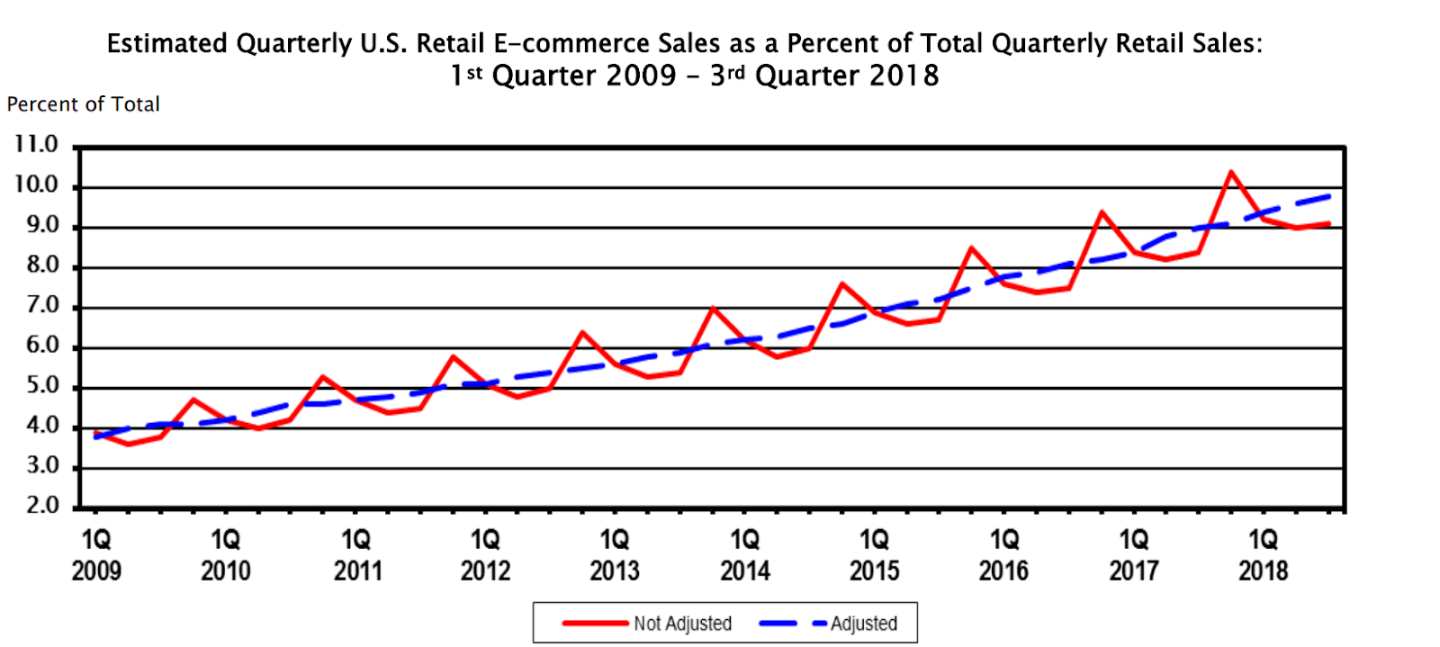The best part about creating a digital product is that you only have to create it once, and you can then sell it thousands of times. When you think about the time and effort that goes into writing an ebook or creating an online course, don’t forget that you can sell that product an infinite number of times without having to put in any additional work (aside from the occasional marketing efforts).
This means that while you are in bed, fast asleep, people around the globe could be buying a digital product you created years ago. It’s passive income, and you don’t have to wake up in the morning and ship anything to the buyer – they already have it.
When you’re considering selling a product and trying to decide between physical and digital mediums, you may be tempted to veer towards the old faithful -- physical wares -- but not so fast.
Physical goods may be a strong market -- and it is, just have a look at the growth rate for retail ecommerce stores -- but it’s plagued with a profit-killer that stops shoppers in their tracks.

And that’s unexpected costs that lead to cart abandonment .
Think about it. How many times do you load up a cart with clothes or gadgets you want only to leave the page at the last step in checkout when you watch your sales total mushroom from shipping, taxes, and handling fees?
These unanticipated costs are the number one contributor to the abandoned cart .

The second-largest influencer behind abandoned carts, forcing users to create an account to finish the checkout, is noteworthy as well.
Because both of these factors are mitigated by digital goods.
While taxes are still present, there’s no shipping cost involved with sending a customer your ebook or workbook when it’s a file, and because you don’t need to know their address, it’s possible to eliminate the barrier of account creation altogether.
There’s also this to consider when it comes down to digital versus physical goods:
You don’t need to insure digital products. Warehouse insurance can get complicated, convoluted, and expensive quickly while leaving brick-and-mortar products out in the cold if those goods don’t sell fast enough to make up the difference in expenses.
And even if you create or manage your goods from your home and bypass insurance, you’re still at risk.
If a disaster strikes, physical products -- some of which may have already been paid for by waiting customers -- are just as susceptible to water, fire, and smoke damage as any other part of your house.
To give you an idea, most homeowners spend between $1,222 to $4,189 for flood damage in Philadelphia -- and that’s without factoring in any costs incurred because of lost products.

Another significant advantage of selling digital products over physical is the lack of middlemen.
And make no mistake: if you’re creating goods to ship to customers, there’s going to be a middleman sooner rather than later.
There has to be if you want to scale.
Which means once your business outgrows your garage, you have to start wrestling with shipping partners, manufacturers, and every other chain in the economy that will hook into your profits and drag them down.
That’s not the case with digital products, however. You can manage, scale, and deliver an ebook to 1,000,000 customers without having to cross through a ninja-grade red tape maze.
Your only fees are your hosting and marketing services, which if you find the right platform , are a simple, flat expense every month or year.
(More on that in the last section.)
Selling digital products also alleviates the need to pre-purchase goods. If you work with a manufacturer to produce physical products, you almost always have to place a minimum -- large -- order and work to offset the balance with your profits.
A practice that can easily leave your income barren when the market fluctuates and your products are no longer positioned to sell.
For instance, like the fidget spinners that became so popular and rapidly plummeted once the trend died down.

But perhaps the most important edge of a digital product -- more than withstanding the throes of the market or cutting out the profit-siphoning middlemen -- is that your product never leaves your control.
Which means that digital product creators never need to contend with product recalls the way merchants who sell physical goods have to.
No one has ever needed to recall an ebook because of a typo that an editor missed (though they may have sorely wanted to), while product recalls are increasingly on the rise for the physical economy.
Recalls that aren’t just expensive, but can be downright dangerous for the consumer and the business.
Bottom line:
Digital products eliminate the most common barriers to purchase, are more resistant to market trends, involve fewer middlemen, and keep control squarely where it belongs (in your hands).
That’s not to say that there aren’t a few disadvantages, as well.

 الشروط والأحكام
الشروط والأحكام






